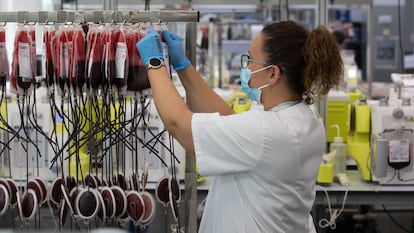Are there really more than 300 blood types?
Compatibility tests are conducted every time someone needs a transfusion because of the many kinds of human plasma

Blood is classified into four major types – A, B, O and Rh – defined by the presence or absence of antigens A and B in the red blood cells. They are the most well-known types because of their importance for transfusions and donor/recipient compatibility. But these are not the only blood types; in fact, they number more than 300.
Because every individual inherits physical attributes from both parents, their blood types vary as well. This is very important, especially for those who have received more than one transfusion, because they can generate antibodies against antigens in the transfused red blood cells that are not present in the patient’s own red blood cells. It’s an immune response to antibodies that are foreign to your body. This results in the development of what are called “irregular” or anti-erythrocyte antibodies, which represent a significant risk in blood transfusions. Blood that will be transfused to another person needs to be free of these antigens so that there is no adverse reaction between the patient’s own antibodies and the antigens present in the transfused blood.
To prevent these adverse reactions, a compatibility study is conducted every time a patient needs a transfusion. The patient’s blood is tested to confirm blood type, and then tested against a sample of the red blood cells to be transfused. To determine whether the transfusion recipient has irregular antibodies, a blood sample is tested against reactive red blood cells with a known antigen composition. If this test is reactive, it means that the transfusion recipient has antibodies that are reacting against one of the antigens present in the cells tested. The antibodies in the recipient’s plasma must then be identified so that a blood donor without the unfavorable antigens can be selected. Irregular antibodies develop in the body after a prior exposure, such as a previous pregnancy or blood transfusion.
In addition to these irregular antibodies, people have anti-A or anti-B antibodies that develop naturally. They are the most important antibodies in transfusions because they are already present in our plasma. If a patient is given blood containing an antigen to which his body has natural anti-A or anti-B antibodies, an immediate hemolytic transfusion reaction occurs. The recipient’s red blood cells rupture, causing intravascular hemolysis, which is a destruction of red blood cells that can be very serious and even cause death. To avoid this reaction, the same blood type or a compatible ABO type must be used in the transfusion. For example, a person with type-A blood and anti-B antibodies cannot receive type-B blood, but can receive type-O blood because it doesn’t contain naturally occurring anti-A or anti-B antibodies.
Among the previously mentioned 300 different blood types are some extremely rare, one-in-a-thousand types that are often only identified after compatibility tests are conducted on a random blood donation. When a transfusion recipient has a rare blood type, a search of blood banks for a compatible blood donation is conducted. Usually, when a person with a rare blood type makes a blood donation, additional tests are conducted to precisely identify these special attributes.
Rare-blood donations receive special handling. The blood is cryopreserved at -112°F (-80°C) degrees, so it is ready to be transported anywhere in the world where it is needed. Once it reaches the patient’s location, the blood is thawed and cleansed to remove the cryopreservation and prepare it for transfusion. The donor is also identified and contacted in advance in case fresh blood donations are needed.
Besides A, B, O and Rh, the most sought-after antigenic profiles are E and e, Duffy a, Duffy b, Jka, Jkb, M, S and s. These are the most common blood types, but there are many more, including all the rare types.
Tu suscripción se está usando en otro dispositivo
¿Quieres añadir otro usuario a tu suscripción?
Si continúas leyendo en este dispositivo, no se podrá leer en el otro.
FlechaTu suscripción se está usando en otro dispositivo y solo puedes acceder a EL PAÍS desde un dispositivo a la vez.
Si quieres compartir tu cuenta, cambia tu suscripción a la modalidad Premium, así podrás añadir otro usuario. Cada uno accederá con su propia cuenta de email, lo que os permitirá personalizar vuestra experiencia en EL PAÍS.
¿Tienes una suscripción de empresa? Accede aquí para contratar más cuentas.
En el caso de no saber quién está usando tu cuenta, te recomendamos cambiar tu contraseña aquí.
Si decides continuar compartiendo tu cuenta, este mensaje se mostrará en tu dispositivo y en el de la otra persona que está usando tu cuenta de forma indefinida, afectando a tu experiencia de lectura. Puedes consultar aquí los términos y condiciones de la suscripción digital.








































